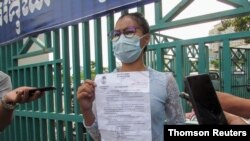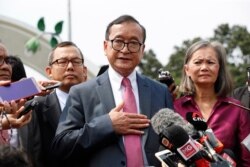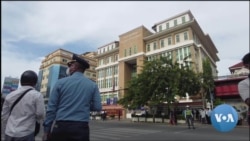For more than a year the Cambodian government has been rounding up supporters of the banned Cambodian National Rescue Party (CNRP) and charging them with treason.
Amid tight security and chaotic scenes, 129 of the supporters appeared Thursday before the Phnom Penh Municipal Court, although their trials have now been put off until early next year.
The arrests follow a failed bid by CNRP leader-in-exile Sam Rainsy to enter Cambodia in November of last year to lead a popular uprising across the country. He had promised to arrest Prime Minister Hun Sen and end Cambodia’s one-party rule.
Among those charged with treason is Theary Seng, a prominent political activist who spoke with VOA shortly before her court appearance.
“Hun Sen and his cronies are afraid of Sam Rainsy returning to continue to do politics in Cambodia,” she said. “So, the first attempt which saw a lot of international support occurred in November 2019, I was involved with the nine-finger campaign and as you may remember Hun Sen threatened anyone who showed the nine fingers with cutting them off.”
“It only made me want to advocate the return some more, which I did,” Seng added.
The nine-finger gesture represented November 9, Independence Day in Cambodia, and the day last year that Sam Rainsy had promised to return from self-exile in France.
It became a popular salute among his supporters in the country, but his return was blocked by neighboring countries, which refused him access to their borders.
Now, many of his supporters could face prison terms of up to 12 years.
Sopheap Chak, executive director of the Cambodian Center for Human Rights (CCHR), said there were issues with Cambodian laws which were being used to silence dissent.
“The problem is you end up in jail simply because of your activism and at the end you would also be convicted at a certain point with a suspended sentence,” she said. “That is a common scenario we have seen and that is somehow a kind of expected fate for any activist in Cambodia.”
The CNRP came close to winning the popular vote at elections in 2013, which shocked the long-ruling Cambodian People’s Party (CPP).
Sam Rainsy refused to accept the result and alleged the vote was rigged, leading to widespread protests. His party was subsequently banned as Hun Sen claimed a “color revolution” was in the making. His CPP won every seat contested at polls in 2018.
Since then, protests have been rare and small but union leaders, journalists, NGO staffers and even people protesting land grabs have been among those arrested. Sam Sokong, a defense attorney, has said more than 200 people have been arrested, faced charges or been summoned.
Among them is Kem Sokha, the CNRP president, who has been detained since September 2017 on charges of treason.
Others to be summoned include Sam Rainsy and senior figures like Eng Chhay Eang, Mu Sochua and former lawmakers Ho Vann, Long Ry, Ou Chanrith and Kong Saphea, who have fled abroad. However, the courts have also imposed travel bans, preventing many from returning home.
New York-based Human Rights Watch has accused the Cambodian government of fabricating allegations.
Athit Kong, vice president of the Coalition of Cambodian Apparel Workers Democratic Union (CCAWDU), urged the government to reconsider its attitude to critics.
“The government should consider and also provide more space for the people to exercise their rights,” he said.
Theary Seng, who is also a U.S.-trained lawyer, said the rounding up of civil society leaders has made it harder to speak out and easier for the government to arrest those who remain of the outspoken CNRP supporters.
“I think they are charging me now because there are no civil society leaders or union leaders who could help mobilize, because these leaders are either detained or are exiled,” she said.
“As you know we have no opposition party, we have no opposition leader, we have very limited free press so it’s opportunistic in their charge of me at this moment in time. The charges are serious.”
Due to the sheer numbers and chaotic scenes at the court, the judges have divided the 129 accused individuals into two separate trials, which will be heard in January and March next year.
Just last month, Sam Rainsy said he would make another attempt at returning to Cambodia, but he declined to say when or how. That raises the prospect of further crackdowns on his supporters.
However, the promise was welcomed by many who had gathered outside the court on Thursday as the political dissidents, flanked by lawyers and security guards, made their first appearances.
One elderly woman, who declined to give her name, chanted in Khmer, “Sam Rainsy will return.”
Another added: “Sam Rainsy, come home – come home.”








